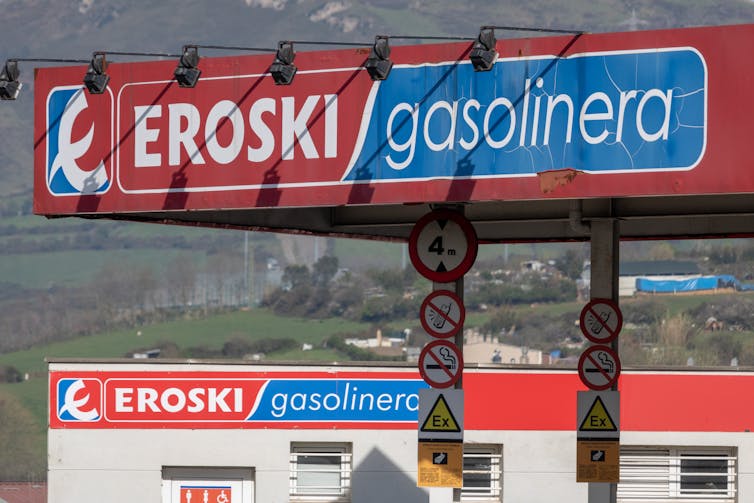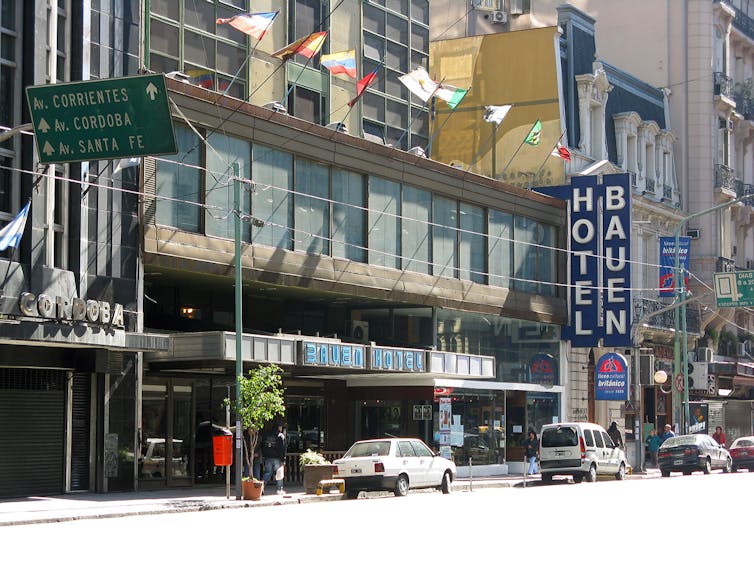Tonight we riot? What Nintendo's 'revolutionary' video game misses about worker liberation
- Written by Dan Musil, PhD Candidate, Institute for Culture and Society, Western Sydney University
“In a world where the wealthy elite control the media, elections and lives of working people, we’re faced with two choices – accept it or fight for something better.”
That’s the premise of Tonight We Riot[1], a new video game for touted as a leftist response to the “neocon fantasies” like Call of Duty.
Too many games “enforce this idea that the very best way to make the world a better place is by massive military force, that you don’t need organisation and societal change”, developer Stephen Meyer[2] has explained. “In our tiny little way, we were trying to be an answer to that.”
But it’s a seductively simplistic answer for anyone serious about worker liberation in 2020.
Tonight We Riot is “an explosive crowd brawler with retro vibes”. It’s a revolutionary fantasy in which worker liberation is achieved through violent street battles.
Sure, it’s fun. But some might think this fantasy epitomises the modern movement for worker liberation.
It doesn’t.
Rather than dreaming of some wild uprising, many are implementing a quiet grassroots revolution. They are getting on with addressing the key problem told by Tonight We Riot: “Those who do not own the means of production will never know real freedom.”
A solution to not owning the means of production is to own it, through democratic and worker-owned enterprises.
Cooperation in practice
Worker-owned enterprises, like other kinds of cooperative and mutual enterprises[3], are neither new nor untested. They draw on internationally recognised principles[4] and practices developed over several centuries.
However these ideas, especially in the 20th century, were often overshadowed by proposals to seize the means of production by force.
Read more: Coronavirus: democracy is the missing link in EU recovery plans[5]
Cooperative principles, on the other hand, are opposed to coercion. Their agenda isn’t to simply smash capitalism but build something better.
The Mondragon example
One of the better known examples of a worker ownership is in Mondragón, in the Basque region. This area was ravaged by the Spanish Civil War and then neglected by the victorious regime of Francisco Franco.
In 1956 a handful of workers established a cooperative that has grown into the Mondragón Corporation[6], a network of more than 100 cooperatives employing and empowering[7] about 82,000 workers.
These cooperatives include Caja Laboral, a co-operative bank; Orbea, Spain’s largest bicycle maker; and Eroski, one of Spain’s biggest supermarket chains.
 The Eroski supermarket chain, with nearly 1,000 outlets across Spain. is a worker-consumer hybrid co-operative within the Mondragón Corporation group.
Shutterstock
The Eroski supermarket chain, with nearly 1,000 outlets across Spain. is a worker-consumer hybrid co-operative within the Mondragón Corporation group.
Shutterstock
Mondragón’s successes demonstrate the virtues of economic democracy[8]. Yet worker co-operatives remain relatively unknown. In part, this is because both news and entertainment media prefer the drama of conflict and competition over cooperation.
Our research[9], however, suggests worker ownership should be a central plank to rebuild more sustainable, equal and resilient post-COVID-19 economies.
Labour hires capital
A capitalist business is owned by whoever puts up the money. Capital employs labour. The point is to make a profit for the owner/s.
In a worker-owned enterprise, labour hires capital. The workers are the shareholders. The point is to provide dignified work that supports workers and society at large.
In most other respects the business models are similar. Both need a viable turnover and have boards of directors. But in the worker-owned business the workers elect the board, and maximising profit comes second to providing livelihoods and serving the community.
Jobs come first
As a result, worker-owned co-operatives are more responsive than purely for-profit business to the communities and environments in which they operate. They create social trust[10] more quickly and foster worker innovation[11]. They don’t send their own jobs offshore.
Cooperatives are also generally more resilient[12] during tough economic times[13].
During past economic difficulties, co-operatives within the Mondragon network have prioritised saving jobs by worker-owners voting to forsake dividends or accept lower pay instead of seeing co-workers sacked.
The support the cooperative give each other is also crucial. In the wake of the 2008 global financial crisis, for example, one of the network’s largest and oldest co-ops (Fagor, a white-goods manufacturer) failed (one of a few to ever do so). The Mondragon network responded by retraining and finding jobs[14] with other co-operatives for the 2,000 affected workers.
Read more: The Mondragon model: how a Basque cooperative defied Spain's economic crisis[15]
Responding to crisis
Crises can also spur the establishment of worker cooperatives.
During Argentina’s economic crisis in the early 2000s, workers took over[16] bankrupt and abandoned businesses and ran them as “worker-recuperated enterprises[17]”.
One of the best-known is Hotel Bauen in Buenos Aires, which went bust in late 2001. In 2003 former hotel staff occupied the shuttered building and began running it themselves. It is still going.
 Hotel Bauen, a recuperated business in Buenos Aires.
Diego Torres Silvestre/Flickr[18]
Hotel Bauen, a recuperated business in Buenos Aires.
Diego Torres Silvestre/Flickr[18]
As of 2018, Argentina had about 400 recuperated enterprises[19]. These provided livelihoods to 16,000 workers in industries from metallurgy to textiles and education.
Our research in Argentina[20] shows democratic enterprises pay workers equally, open premises up to community initiatives, and direct their surpluses into local development.
Their response to the COVID-19 pandemic is notable too, with a number converting their operations to produce medical supplies[21].
Read more: Canada’s co-operatives: Helping communities during and after the coronavirus[22]
Worker cooperatives in Australia
Australia has a long tradition of consumer cooperatives, particularly in financial services and agriculture. But worker cooperatives remain few in number. Three examples are:
Though the ethos of cooperation is self-help, government policies play a critical role in their establishment and growth.
Many people would like to start a cooperative. But they need help with business skills and access to capital.
Countries with more developed cooperative sector give such support. Italy, for example, has laws[23] to encourage “negotiated conversions” of businesses to cooperatives. This includes funding to assist worker buyouts and training in business management skills, as well the skills required for democratic decision-making.
Both federal and state governments need to ensure laws and business support programs don’t exclude the needs of cooperatives. Specific support for start-up funds[24], education and training is key.
Read more: Giving workers a voice in the boardroom is a compelling corporate governance reform[25]
More generally, the cooperative movement is also impeded by a lack of public awareness. In a 2017 survey, for example, just 47% of Australians[26] said they had heard of co-operatives or mutual enterprises, yet 85% were actually members of one.
Ironically, the developers of Tonight We Riot, Pixel Pushers Union 512[27], are also organised as a worker co-operative.
Perhaps the principles of co-operative and mutual enterprise[28] would not have made for a headline-grabbing video game. But unlike dreams of street-fought revolution, the work of creating more democratic workplaces and economies is already underway. It is as important as ever.
References
- ^ Tonight We Riot (www.nintendo.com)
- ^ developer Stephen Meyer (variety.com)
- ^ cooperative and mutual enterprises (bccm.coop)
- ^ internationally recognised principles (www.ica.coop)
- ^ Coronavirus: democracy is the missing link in EU recovery plans (theconversation.com)
- ^ Mondragón Corporation (www.mondragon-corporation.com)
- ^ employing and empowering (journals.sagepub.com)
- ^ the virtues of economic democracy (probonoaustralia.com.au)
- ^ Our research (www.communityeconomies.org)
- ^ social trust (link.springer.com)
- ^ innovation (onlinelibrary.wiley.com)
- ^ more resilient (www.emerald.com)
- ^ tough economic times (www.ilo.org)
- ^ retraining and finding jobs (www.yesmagazine.org)
- ^ The Mondragon model: how a Basque cooperative defied Spain's economic crisis (theconversation.com)
- ^ workers took over (www.tandfonline.com)
- ^ worker-recuperated enterprises (brill.com)
- ^ Diego Torres Silvestre/Flickr (www.flickr.com)
- ^ 400 recuperated enterprises (www.tandfonline.com)
- ^ Our research in Argentina (www.elgaronline.com)
- ^ produce medical supplies (www.pagina12.com.ar)
- ^ Canada’s co-operatives: Helping communities during and after the coronavirus (theconversation.com)
- ^ has laws (www.euricse.eu)
- ^ start-up funds (www.cooperativefund.org)
- ^ Giving workers a voice in the boardroom is a compelling corporate governance reform (theconversation.com)
- ^ just 47% of Australians (bccm.coop)
- ^ Pixel Pushers Union 512 (www.facebook.com)
- ^ co-operative and mutual enterprise (bccm.coop)
Authors: Dan Musil, PhD Candidate, Institute for Culture and Society, Western Sydney University














